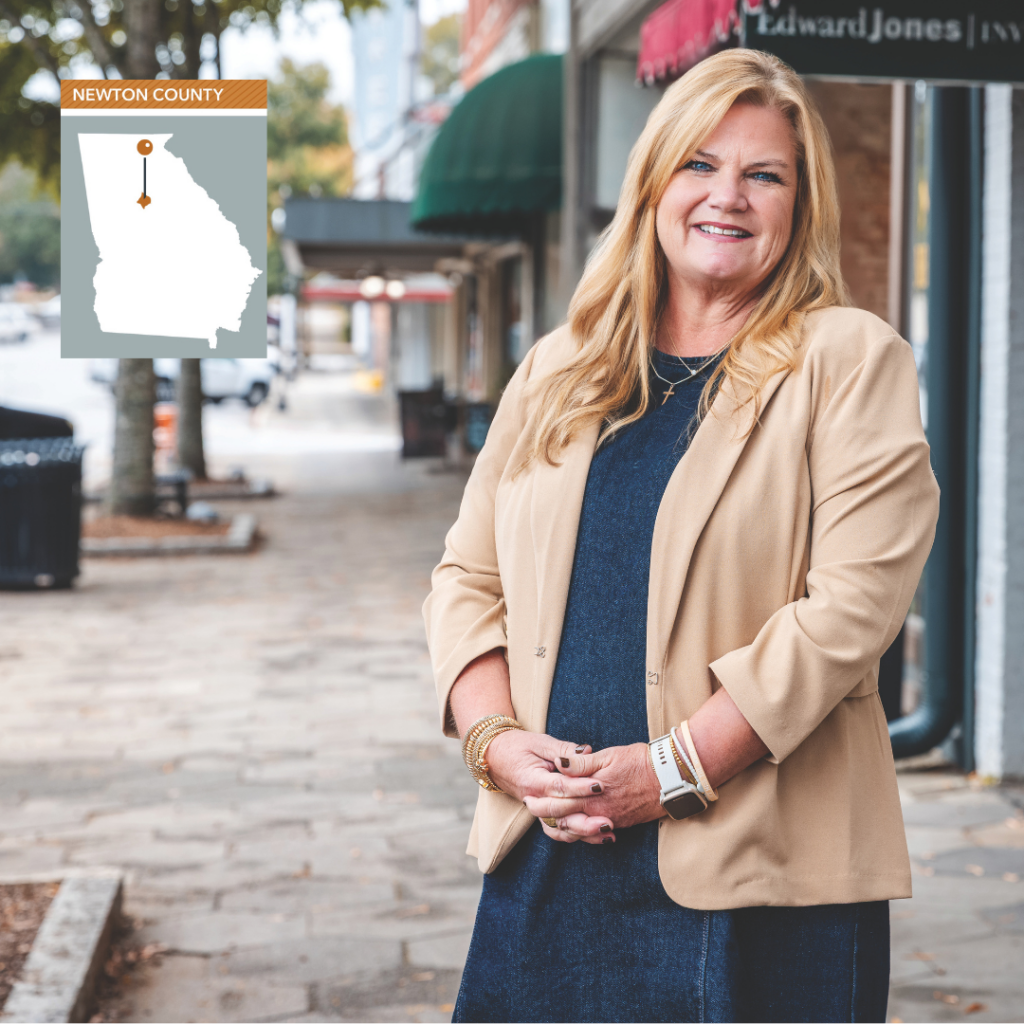Douglas | Coffee County: Percolating with Promise
Workforce, higher education and retail.
 The city of Douglas may be 45 miles from the nearest interstate highway, but the county seat of Coffee County is home to major industry that continues to expand locally, and the retail sector is booming.
The city of Douglas may be 45 miles from the nearest interstate highway, but the county seat of Coffee County is home to major industry that continues to expand locally, and the retail sector is booming.

New Industry: Matt Seale, CEO of the Douglas-Coffee County Chamber of Commerce and Economic Development Authority, photo Frank Fortune.
“This is the community that got a Walmart distribution center without an interstate running through it,” says Matt Seale, CEO of the Douglas-Coffee County Chamber of Commerce and Economic Development Authority (EDA). “Between the distribution center and dispatch center, that represents well over 1,000 jobs. They’re one of our largest employers for sure.”
Walmart has just embarked on a multiyear, $400 million expansion, according to Seale, and they’re not the only ones expanding.
Carrollton-based Southwire, which manufactures wire and cable used in the transmission and distribution of electricity, expanded last year by adding new lines of production to its two plants in Douglas and creating 33 new jobs, according to Seale.
In the spring of 2022, Pilgrim’s Pride Corp. broke ground on a more than $75 million expansion. With the addition of the pet food manufacturing facility, Pilgrim’s will become a fully integrated operation, including hatchery, growth houses, feed mill and more. The Pilgrim’s expansion is expected to create as many as 75 new jobs, according to Seale, who says the pet food ingredient operations are expected to begin this month. The company already employs more than 800.
“The great story is once a business comes here, not only do they stay and become part of the community, they expand here and increase their investment,” he says. “You always want new industry to add to the list, but you also want to keep those that are already here.”
Seale says what’s interesting about Douglas and Coffee County is that while it has the businesses and industry you would expect to find in a rural county – like Premium Peanut, which processes more than 10% of the nation’s peanuts – there are some things you might not expect to find like Optima Chemical, a company that makes additives for jet fuel and PCC (Precision Castparts Corp.) Airfoils, which makes jet engine parts for Boeing and Airbus.

Legume Leader: Farm owned by Premium Peanut, which processes more than 10% of the nation’s peanuts, photo contributed.
“If you are flying on a commercial airline overseas you are very likely flying in a plane that has parts in it made in Douglas, Georgia, and fueled with jet fuel that has an additive made by Optimum Chemical in Douglas, Georgia,” he says. “We’re a small, rural community seeking [people who have] Ph.D.s, which is unusual.
“The whole economy is certainly ag-centric, but it’s not agricultural only. We have a very diversified industrial base and that only looks to grow.”
Educating the Workforce
Helping to meet the educational and workforce development needs of the region are South Georgia State College (SGSC) and Wiregrass Georgia Technical College. SGSC was Georgia’s first state-supported junior college, but before that, it was a secondary school called the Eleventh District Agricultural & Mechanical School. Established in Douglas in 1906, the A&M school was designed to prepare rural students for farm life. In 1927, it became a two-year college and was renamed South Georgia Junior State College. It became part of the University System of Georgia in 1932 and was given the name South Georgia College. And in 2013, two years after the Board of Regents redesignated it a four-year institution, it consolidated with Waycross College and got its current name.
“We’ve been here over 100 years,” says Interim President Greg Tanner. “We continue to focus on our region and preparing our students for employment.”
Traditionally a two-year institution where students can pursue associate degrees in 20 programs, the college’s offerings have grown to include seven bachelor’s degree programs. The college serves approximately 1,800 students across two campuses in Douglas and Waycross and an instructional site in Valdosta.
“Our students come from 11 other states, as well as four countries,” Tanner says. “Our enrollment is up; last fall it was up over 3%, and we have been up over four semesters now.”
With its first graduates in mechanical engineering technology on the horizon, Tanner says he’s also very excited about the growth in the college’s education programs, including a new paraprofessional-to-teacher track, which leads to a Bachelor of Science in elementary and special education.
“Our education program is growing with the support of our regional school superintendents,” he says. “The superintendents in our region are very supportive of our education program. Our students are offered a contract before they even graduate.”
One of those supportive superintendents is Morris Leis, who oversees the 12 schools and 7,500 students enrolled in the Coffee County School District. According to Leis, the district is hiring newly minted teachers through both the traditional bachelor’s degree program and the new parapro-to-teacher initiative.
“We’re benefitting greatly from the number of teachers we are employing through the SGSC education program,” he says. “With the teacher shortage, they are helping us fill our classrooms with qualified teachers.”

Increasing Investment: Matt Seale, CEO of Douglas-Coffee County Chamber of Commerce and Economic Development Authority, and Charlie Davis, Douglas city manager, at the Pilgrim’s Pride complex, photo Frank Fortune.
According to Tanner, the parapro to-teacher program is unique to the area and meets a long-standing need. (Similar programs are offered at other schools, but they are a two-hour drive from SGSC’s Douglas campus). The first cohort was admitted in fall 2022, enrolling 24 paraprofessionals for the five-semester program which includes summer. Those students are graduating in May. The second cohort enrolled 21 students in the fall of 2023. Parapros from 12 different school districts are currently part of the program, which partners with 15 counties.
“Some systems are giving scholarships to those paraprofessionals who want to become teachers and that speaks volumes to the support of the program,” Tanner, a former elementary school principal, says. “It’s a big win-win for the students and the school systems.”
Just as SGSC is partnering with local school systems to get more teachers into classrooms, Wiregrass Georgia Technical College (WGTC) is partnering with Coffee Regional Medical Center to produce more nurses.
“To me, it really is one of those partnerships that reflects that when people share their needs and are willing to work with others then it creates some great solutions,” WGTC President DeAnnia Clements says.
Although WGTC previously offered a licensed practical nursing (LPN) program on its Douglas campus, its only registered nursing (RN) program was taught on its Valdosta campus, according to Clements. Coffee Regional Medical Center donated $300,000 to the college to help offset the cost of starting an RN program in Douglas. The donation supports the new Associate of Science in nursing (RN).
“In August 2023, we started our first RN program on the Douglas campus with 30 students,” Clements says. “Our goal is to grow the number of accepted students to 50.”
In December, the college named its nursing wing the Coffee Regional Medical Center Nursing Wing in recognition of the donation.

Collaborative Solutions: Wiregrass Georgia Technical College President DeAnnia Clements, photo contributed.
“We want to build that relationship so they can recruit nurses to their medical center,” Clements says. “Our whole mission as a college is to meet the workforce demands of the 11 counties we serve, and healthcare is a big part of that.”
Additional health sciences programs offered by WGTC in Douglas include dental assisting, dental hygiene, emergency medical services, healthcare assistant, healthcare management, pharmacy technology and radiologic technology.
WGTC’s Douglas campus also has a school of arts and sciences, school of business and public services, and school of trade and technology. Other campuses have programs in advanced manufacturing, commercial truck driving, cybersecurity and automotive. WGTC just added a program of study in aviation, Clements says.
“We had 1,698 graduates last year and 2,703 different awards [technical certificates, diplomas or degrees] were given to those graduates,” she says. “One thing that is great when you look at that number is that 677 were dual-enrollment students, so when they leave high school, they have a credential and can immediately go to work or continue their education with us or somewhere else.”
Through its economic development department and partnership with Goodwill Industries of the Southern Rivers, WGTC recently offered a free, four-week construction program at its Coffee County campus. Douglas Mayor Tony Paulk, a licensed residential contractor, was among the 11 graduates.
“I thought there’s no way you’re going to put all this information in a 20-day program, but they did, and it was very good,” Paulk says. “[The program] gave the individuals committed to this project some skills that are transferable and have value in the construction world.”
Students got instruction in framing, roofing, flooring, electrical, plumbing, HVAC and employability skills. After completing the program, students earned certifications in OSHA-10, meaning they learned about common safety and health hazards on the job; basic knowledge of forklift operations and safety; and CPR.
“What I tell individuals is, with me being a licensed contractor, I’ve had some commercial and housing projects, but there’s a monumental difference between someone showing you how to do something versus showing you the math and the science behind it,” Paulk says. “‘This is why we’re doing this,’ instead of ‘This was just the way I was shown.’ Goodwill brought forth the why of it being done.”
Retail Boom

Supportive Administrator: Superintendent Morris Leis oversees 12 schools and 7,500 students enrolled in the Coffee County School District, photo Frank Fortune.
With construction going on “everywhere” in the community, Paulk says the skills taught through the program will allow participants to immediately fill job openings. In addition to the job opportunities created by industrial growth, retail has grown significantly in recent years as well, according to Coffee County Administrator Wesley Vickers.
“A Publix grocery store [opened] in January and that’s going to be huge for us,” Vickers says. “We’ve been trying to get one for several years.”
Publix joins Starbucks, Marshall’s, Hobby Lobby, Five Below, Petco and Chick-fil-A as recent additions to the community.
“We draw from three or four counties around us for retail,” he says. “There’s been a lot of retail growth here in the last three years and that helps other existing businesses as well.”
That ripple effect can be seen in existing businesses like Douglas landmark Bobby’s Treat Shop, Danny’s Pizza, Wendy’s and Taco Bell building new buildings and private developers giving downtown Douglas “a facelift,” the mayor says.
“Private investors have gone into downtown Douglas and done wonderful things,” Paulk says. “There are three new restaurants and an ax-throwing facility. There’s a restaurant coming to Douglas that put the announcement on its website before it put permitting before the city. There’s just a lot of great things going on right now in Douglas.”

New RN Program: Nursing students at Wiregrass Georgia Technical College receive hands-on training, photo contributed.
While city and county leaders rightfully laud all the job creation, it doesn’t come without challenges. Like a lot of communities across the state, Douglas and Coffee County are struggling with a critical need for workforce housing.
To meet that challenge, the Douglas-Coffee County EDA was recently awarded a $2.3 million grant from the One Georgia Authority Rural Workforce Housing Infrastructure program.
“The governor, in his wisdom, recognized that because of the growth in industry statewide there’s a housing shortage, and he challenged the Department of Community Affairs to put together a program to help communities deal with workforce housing issues,” says Stuart Smith, president of the EDA board and president of Douglas National Bank. “We were one of the first communities in the state to get a grant of this nature.”
The money is being used to kick-start a housing project, according to Smith. The grant announcement was made in September and the infrastructure work is underway.
“It’s a huge win for us,” he says. “I believe it’s about 70 single-family homes in that project. It will be the perfect price point for workforce housing.”
Putting Coffee County on the Map
Not only is Coffee County a great place to live and work, it’s also a great place to visit, according to Stephanie Childers, director of tourism and events for the chamber. The county is home to two museums, General Coffee State Park and Broxton Rocks – a 1,650-acre preserve that contains 530 plant species, some of them threatened or endangered, Indigo snakes, gopher tortoises and more than 100 species of bird, as well as a host of other mammals and reptiles.

Lifelong Learning: Douglas Mayor Tony Paulk is also a licensed residential contractor, photo Frank Fortune.
The Heritage Station Museum depicts the community’s history as one of the major tobacco markets in Georgia during the 1920s and 1930s, while the WWII Flight Training Museum tells the story of the 63rd Army Air Forces Contract Pilot School based in Coffee County and the aviation cadets who trained there as the 63rd Army Air Forces (AAF) Flying Training Detachment.
“It’s the largest intact, complete and original flight school left in the U.S. from WWII,” Childers says. “There are 13 original buildings still standing, and one houses the museum.”
The museum resides in the former instructors’ barracks and includes exhibits about the 63rd’s training, aircraft and facilities. The former air base is a stop on Georgia’s World War II Heritage Trail.
“[The museum] just kind of gives everyone a sense of what Coffee County did to help in the war effort,” Childers says. “It put Coffee County on the map, so to speak.”

New Retail: Publix joins Starbucks, Marshall’s, Hobby Lobby, Five Below, Petco and Chick-fil-A in Douglas, photo Frank Fortune.
To honor that legacy, in April the chamber will host its second annual “Wings and Things Festival and Fly-In” at the airport.
“Last year we weren’t really sure what to expect, but we had probably 5,000 people there, so we were excited,” she says. “It should be even bigger and better this year.”
With so many good things happening in Douglas and Coffee County, the area is brewing with potential.
Local Flavor
Keeping Veterans Memories Alive

Amateur Historian: Don Brooks restores WWII aircraft in one of the hangars of a former air base that served as a flight training school during the war, photo Frank Fortune.
In the Apple TV+ Miniseries Masters of the Air World War II hero Robert “Rosie” Rosenthal says he learned how to fly a bomber plane in Texas. But Georgia businessman and amateur historian Don Brooks is quick to share that Rosenthal was also one of about 10,000 pilots who trained at the 63rd Army Air Forces Contract Pilot Training School (Primary) Air Base in Douglas.
Rosenthal was a bomber pilot who flew 52 missions and survived being shot down – twice. He was awarded 16 decorations, including the Distinguished Service Cross, Silver Star, Distinguished Flying Cross and a Purple Heart.
“The pilots that went through our training facility, those guys went on to fly every type of airplane in every area of operations in WWII,” Brooks says, adding that the first class of cadets graduated within a week after the attack on Pearl Harbor.
“Our airport was open in 1927,” Brooks says. “South Georgia State College started a flight school here around 1931. [By 1939], Europe and Asia were already in the war and we knew sooner or later the U.S. would be in that war, too. So, the government started looking for smaller airports where they could operate these flight schools under contract with the government. The airport and the fact we already had a local flight school gave us a big advantage, so we were selected.”
By 1945, the air base began drawing down its training operations and it was eventually closed, Brooks says. He says over the years the base has been used for a wide variety of purposes, including providing housing in the former barracks and as a training field for a minor league team of the Cincinnati Reds. Some of the buildings were used as a school for a while after an existing school burned down, and at one point, one of the barracks buildings served as the home of legendary Florida State University head football coach Bobby Bowden.
“His first coaching job was in Douglas at South Georgia College,” Brooks says. “They gave him one of the barracks buildings to live at the base. His first son was born here in Douglas while he was out at the base.”
While its uses have varied over the years, two of the original hangars remain, one of which is used by Brooks for the restoration of WWII aircraft.
“I do it because I enjoy it,” Brooks says, “but I also do it to help keep the memory of our veterans alive.”







